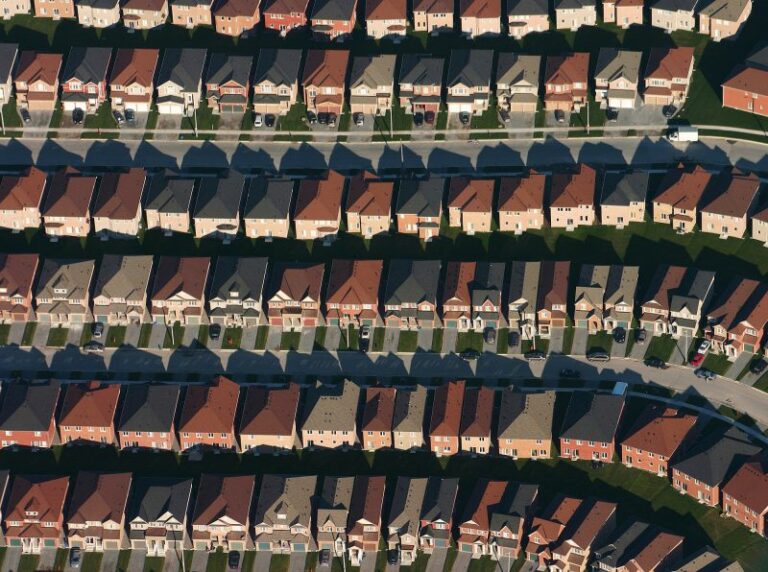Physical Address
304 North Cardinal St.
Dorchester Center, MA 02124
Physical Address
304 North Cardinal St.
Dorchester Center, MA 02124

"These two homes straddle a 2010 zoning boundary change. The result: The house in duplex zoning converted into two homes, and the other converted into a McMansion that cost 80% more." - Arthur Gailes

The adoption of zoning as a means of preventing external costs led to inefficient use of land and caused many individuals to suffer great unfairness.

Inclusionary Zoning is an Oxymoron The term “Inclusionary Zoning” gives a nod to the fact that zoning is inherently exclusionary, but pretends to be somehow different. Given that, by definition, zoning is exclusionary, Inclusionary Zoning completely within the exclusionary paradigm is synonymous with Inclusionary Exclusion. What is Inclusionary Zoning? “Inclusionary Zoning” is a policy requiring a certain percentage of units in new developments to be affordable to certain income groups. Sometimes, this includes a slight loosening of restrictions on the overall scale of the development, but rarely enough loosening to overcome the burden of subsidizing units. Many cities, particularly the most expensive ones, have adopted Inclusionary Zoning as a strategy intended to improve housing affordability. Often, demand for below-market units are so high, one must literally win a lottery to obtain a developer-subsidized unit. Economics of Exclusion We must first acknowledge the purpose of zoning is to EXCLUDE certain people and/or businesses from an area. Zoning does this by limiting how buildings are used within a district, as well as limiting the scale of buildings . These restriction cap the supply of built real estate space in an area. As we know from microeconomics, when rising demand runs into this artificially created upward limit on supply, prices rise to make up the difference. As every district in a region competes to be more exclusive than its neighbors through the abuse of zoning, regional prices rise in the aggregate. Since the invention of the automobile, and subsequent government overspending on highways, sprawl has served as the relief valve. We’ve built out instead of up for the last several decades and this sprawl has relieved some of the pressure major metropolitan areas would have otherwise felt. In fact, it’s worked so well–and led to the abuse of zoning rules for such a long time–that exclusionary zoning has become the accepted paradigm. Zoning is the default flavor of […]
I’ve been meaning to address the public education system’s complex role in land use patterns, and found that Murray Rothbard does a better job in his 1973 manifesto, For a New Liberty than I ever could. In summary, locally-funded public education is an engine of geographical segregation, which encourages flight from urban areas, and was a driving motivation for the popular acceptance of exclusionary zoning in newer suburbs. As a result, wealth is consistently concentrated geographically, and housing affordability is at odds with these restrictions of supply intended to exclude poorer people from draining the property tax base. Here’s a paragraph from the chapter on education: The geographical nature of the public school system has also led to a coerced pattern of residential segregation, in income and consequently in race, throughout the country and particularly in the suburbs. As everyone knows, the United States since World War II has seen an expansion of population, not in the inner central cities, but in the surrounding suburban areas. As new and younger families have moved to the suburbs, by far the largest and growing burden of local budgets has been to pay for the public schools, which have to accommodate a young population with a relatively high proportion of children per capita. These schools invariably have been financed from growing property taxation, which largely falls on the suburban residences. This means that the wealthier the suburban family, and the more expensive its home, the greater will be its tax contribution for the local school. Hence, as [p. 133] the burden of school taxes increases steadily, the suburbanites try desperately to encourage an inflow of wealthy residents and expensive homes, and to discourage an inflow of poorer citizens. There is, in short, a breakeven point of the price of a house beyond which a […]
Welcome to the final post in the series discussing the consequences of rent control. Thank you to the subscribers who have patiently awaited each new post. I hope everyone found it enlightening. If you haven’t read the entire series, you can catch up with these links: Rent Control Part One: Microeconomics Lesson and Hording Rent Control Part Two: Black Market, Deterioration, and Discrimination Rent Control Part Three: Mobility, Regional Growth, Development, and Class Conflict Conclusion Rent control is not just a simple price control setting the price at which willing renters and landlords are permitted to do business, it is much worse. It is a coercive act that gives landlords no legal option, but to rent to a tenant against his will, often at a financial loss. Rent control adds a non-voluntary burden to landlords which deepens over time because landlords do not have the option to rent to a tenant at below market rates. Not only does rent control cause huge distortions in the housing market, but the burdens fall disproportionately on the poor and underprivileged people it was intended to benefit. Although particular people are able to live with the comfort of low rent payments, even those renters will see their living conditions deteriorate as landlords neglect repairs and maintenance. As the situation gets worse, middle class residents are able to move away, leaving behind the poorest residents who have become reliant on the reduced rent. In effect, rent control grants property rights to renters, that originally belonged to the original property owners. Rent control becomes a redistribution of wealth to rent control tenants away from apartment owners, market apartment renters, and newcomers to the area. Nonetheless, over time the quality of life decreases for all residents of a city where rent control is imposed. Solutions So, it […]